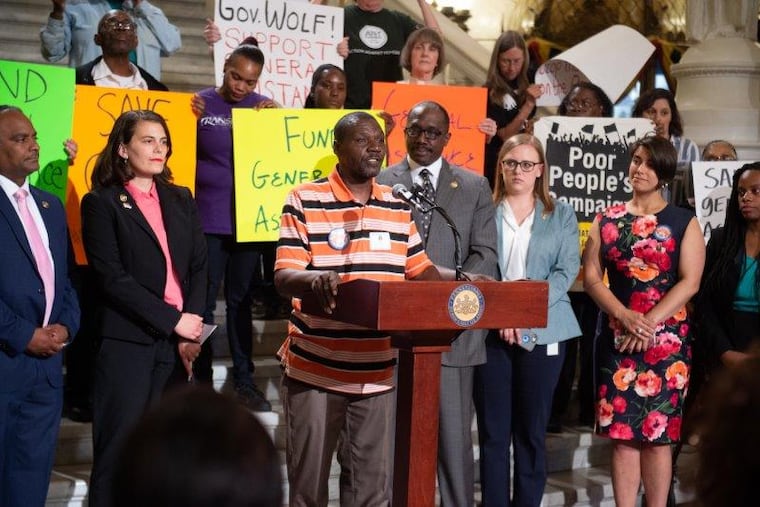General assistance in Pa. is too important to lose | Opinion
Lawmakers are considering tearing dollars out of the hands of people who are literally unable to buy feminine hygiene products or pay for bus fare without them.

Danielle, 40, wanted to leave an abusive relationship but relied on her partner for food and housing. When she finally was able to escape, she needed help to afford her utility bills, food, toiletries, medications, and transportation to the doctor. Without General Assistance, she wouldn’t have been able to afford the things she needed to survive.
While Jeanette, 62, from Philadelphia was waiting to be approved for disability she relied on General Assistance to buy feminine hygiene products and toothpaste. She also credits the program with keeping her from becoming homeless during a time she wasn’t able to work.
Vincent, 52, of Upper Darby struggles with a substance use disorder and needs to go to a recovery program three times a week. General Assistance helps him get there, cover his medical copays, and buy deodorant. If unable to get to his treatment sessions, Vincent would be at risk for relapse.
These are real Pennsylvanians who struggle everyday to survive. Pennsylvania’s General Assistance program is a last resort for many of them. General Assistance (GA) pays around $200 a month to about 9,000 Pennsylvanians who oftentimes have nowhere else to turn. With this help, folks are able to pay to rent a room in a friend’s house instead of sleeping outside on a bench, buy a bus ticket to escape an abusive situation, or get a warm coat in the winter. It’s not a lot of money, but for many GA recipients it can be the difference between living or dying.
The Pennsylvania Supreme Court recently reinstated General Assistance last year after a lengthy legal battle following the program’s termination by the legislature in 2012. Before GA was eliminated in 2012, it helped 70,000 Pennsylvanians. Since reinstatement, its numbers have been smaller, serving about 9,000 Pennsylvanians across the state. How many people were hurt during that time? How many people died?
That’s why a coalition of more than 150 health, legal, social justice, community and religious organizations is fighting to preserve this program so our neighbors and family members can survive.
While other programs help people in need get food and housing, GA fills a vital gap for people to buy deodorant, toilet paper, and other items that would otherwise be impossible to afford. Yet a bill has been introduced in the state House to eliminate the program, and lawmakers continue to hammer out funding priorities in the budget. That any lawmaker could consider tearing dollars out of the hands of people who are literally unable to buy feminine hygiene products or pay for bus fare otherwise is morally reprehensible.
Preserving General Assistance is a morally-sound decision. It is also fiscally-wise. It doesn’t cost taxpayers much, amounting to a very small percentage of the total state budget. The program is temporary — lasting only 9 months or until someone gets approved for disability — and aims to keep folks who are facing serious crises from needing emergency services, like shelters and hospitals.
People on General Assistance live in every county in our state. It helps people from Allegheny to Lackawanna County and Philadelphia to Schuylkill County get by, in many cases avoiding more expensive programs and supports.
Many of us will never know what it is like to scrape together change just to buy dental and hygiene supplies. Many of us will not have to choose between being free from violence or continuing to live with an abusive person so we have housing and food. Many of us will not know the pull of addiction. But we might. Maybe we’ve already been through one of these struggles and survived. Many of us are just one experience, one shred of luck, away from facing staggering life challenges. That’s why we are joining with the coalition of more than 150 organizations to fight to preserve General Assistance as it is: so that our neighbors, our brothers and sisters, and our fellow Pennsylvanians can survive. We are counting on state lawmakers and Governor Wolf to stand with us in this fight.
Kate M. Esposito is co-chair for the economic dignity team at POWER Philadelphia. Maria Pulzetti is staff attorney at Community Legal Services of Philadelphia. Elizabeth Fiedler is a Pennsylvania State Representative for South Philadelphia.